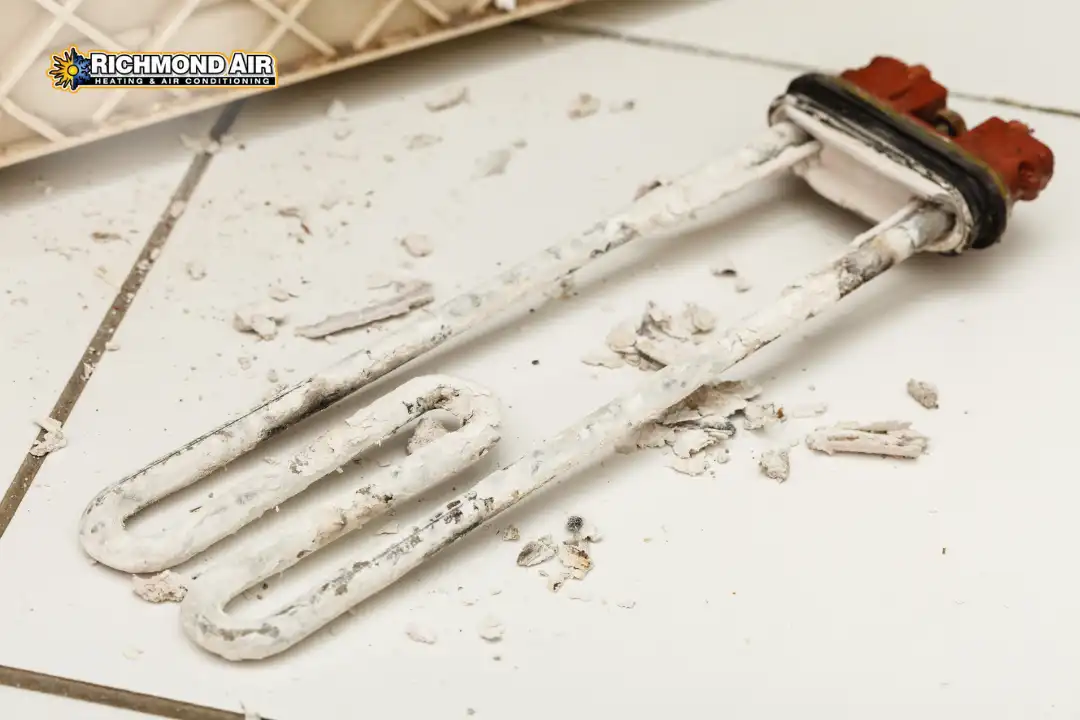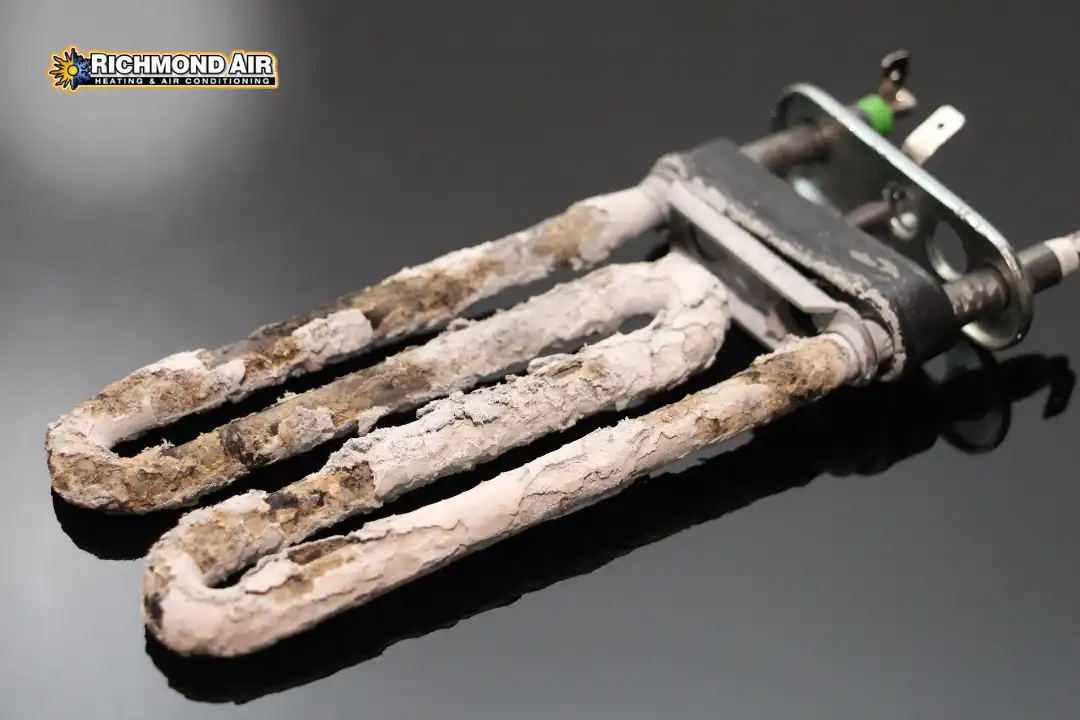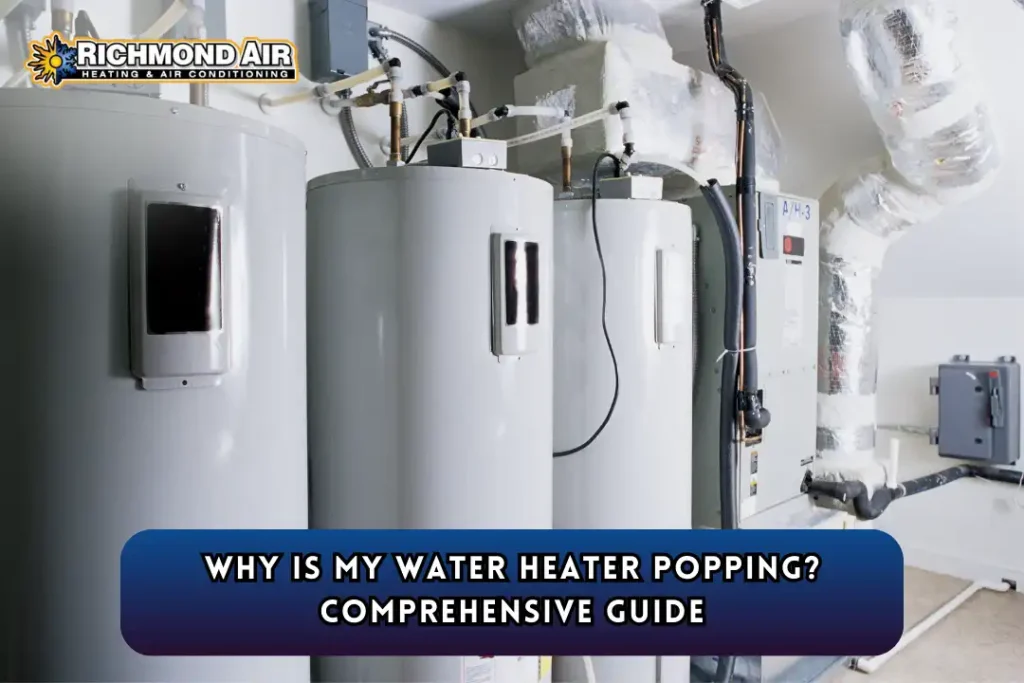Ever sat in your living room, minding your own business, and suddenly heard a weird popping or rumbling noise? It’s unsettling, especially when it seems to come from your water heater. At first, it might feel like your appliance is plotting something sinister. If you’ve found yourself asking, why is my water heater popping?, don’t worry—you’re not alone. I’ve been in the same boat, and trust me, it’s not as scary as it sounds. The good news? That mysterious noise is your water heater’s way of asking for attention, not threatening to explode.
Before you call for costly repairs, let’s explore why it’s happening, what it means, and how you can fix it like a pro.
What Causes the Water Heater Popping Noise?
The popping noise usually means there’s a buildup of sediment at the bottom of your water heater. Here’s the deal:
- Water contains minerals like calcium and magnesium.
- Over time, these minerals settle at the bottom of the tank, forming a layer of sediment.
- When the water heater heats up, the trapped water underneath the sediment boils and creates steam, which makes those popping and rumbling sounds.
Think of it like a pot of water boiling with a stubborn layer of grit at the bottom. It’s not dangerous (most of the time), but it’s definitely a sign your water heater needs some TLC.
When you hear popping or rumbling, don’t dismiss it. This is your water heater telling you there’s sediment buildup that needs to be addressed.
My Experience with heater heater popping
A few years ago, I moved into a house with an older water heater. I remember the first time I heard the popping noise, at 3 a.m., no less. At first, I thought someone was breaking in! Turns out, it was just my water heater throwing a tantrum because it hadn’t been flushed in years.
I ignored it for a while (big mistake) until one day, my hot water turned lukewarm at best. That’s when I learned the hard way about sediment buildup. After some DIY research and a bit of elbow grease, I managed to flush the tank and quiet the noise, for a while, anyway.
Why Is Sediment Buildup a Problem?
Let’s get technical for a minute. Sediment might seem harmless, but it can cause a bunch of problems:

Reduced Efficiency
When sediment builds up at the bottom of your water heater, it forms a thick layer that acts like a blanket over the heating element. This makes it harder for the heater to warm the water because the heat has to pass through the sediment first. As a result, the heater uses more energy to do its job, and you’ll notice your energy bills going up. It’s like trying to cook with a pot that has a thick crust on the bottom, it takes longer and wastes energy.
Uneven Heating
The sediment buildup doesn’t just affect efficiency; it also messes with how evenly your water heater works. Since the heat gets trapped by the sediment, the water at the bottom of the tank gets hotter than the water above it. This uneven heating means you might get hot water sometimes and lukewarm water at other times. It’s frustrating, especially when you’re relying on a steady hot water supply for your shower or chores.
Shortened Lifespan
Sediment buildup can do more than just make your water heater noisy or inefficient, it can actually damage it over time. The minerals in the sediment can corrode the inside of your water heater tank, eating away at the metal and causing leaks. This kind of damage can shorten the life of your water heater, meaning you’ll have to replace it sooner than you expected. It’s like rust on a car, it starts small but can cause big problems if you don’t deal with it.
Noisy Operation
The popping or rumbling sounds coming from your water heater might seem harmless, but they’re actually a warning sign. These noises happen because trapped water beneath the sediment layer turns into steam and escapes. While the sounds themselves are annoying, they’re a clue that something isn’t right inside your tank. If you ignore them, the underlying issues like sediment buildup can lead to bigger problems, such as reduced efficiency, uneven heating, or even tank damage.
How to Fix a Popping Water Heater
If your water heater is popping, it’s time to act. Flushing the tank or installing a sediment filter can restore quiet and efficiency
Flush the Tank
Flushing the tank is the most effective way to remove sediment.
- Turn off the power or gas supply: Safety first.
- Shut off the water supply: Close the cold-water inlet valve.
- Drain the tank: Connect a garden hose to the drain valve and let the water flow out.
- Rinse and repeat: Open the cold-water valve briefly to stir up and flush out the remaining sediment.
If you’ve never done this before, check your heater’s manual or watch a quick tutorial online.
Install a Water Softener
If you live in an area with hard water (like I do), a water softener can help reduce mineral buildup in the first place. It’s an investment, but one that pays off in the long run.
Consider a Sediment Filter
A sediment filter installed before the water heater can catch larger particles before they reach the tank.
Call a Pro
If the popping noise persists or you’re not comfortable DIY-ing, call HVAC professional. Sometimes the sediment is so hardened that professional tools are needed to break it up.
Tips to Prevent Sediment Buildup
Keeping your water heater in good condition is easier than dealing with costly repairs. Here are some simple and practical steps to prevent sediment buildup and ensure your water heater works efficiently:

Flush Your Water Heater Regularly
Over time, minerals in the water settle at the bottom of your tank, forming sediment that can cause noise, reduced efficiency, and even damage. To prevent this:
- Flush at least once a year: Attach a garden hose to your water heater’s drain valve, drain the tank, and refill it to remove any sediment.
- Flush more often if you have hard water: Hard water contains more minerals, so consider flushing every six months.
Regular flushing keeps your tank clean, improves efficiency, and extends its lifespan.
Check the Anode Rod
The anode rod is a critical part of your water heater. It attracts corrosive elements in the water, protecting the tank from rust. Here’s what to do:
- Inspect it annually: Check the rod for signs of wear, like thinning or corrosion.
- Replace it when needed: If the rod is heavily corroded or less than half an inch thick, it’s time for a replacement.
Replacing the anode rod is a simple and inexpensive way to prevent rust and prolong your water heater’s life.
Lower the Water Temperature
The hotter the water, the faster minerals separate and settle at the bottom of your tank. Lowering the temperature helps prevent this.
- Set your water heater to 120°F: This temperature is hot enough for household needs while slowing sediment buildup.
- Save energy, too: Lowering the temperature reduces your energy bill and decreases the risk of scalding accidents.
Install a Water Softener
If you live in an area with hard water, installing a water softener can make a big difference. Here’s how it helps:
- Reduces mineral content: A water softener removes calcium and magnesium from your water before it enters the tank.
- Protects your appliances: Softened water also helps prevent scale buildup in other appliances like dishwashers and washing machines.
While a water softener won’t eliminate existing sediment, it prevents new deposits from forming, reducing maintenance in the long run.
By following these tips, you can keep your water heater running smoothly, save money on repairs, and ensure you always have hot water when you need it. A little maintenance goes a long way!
Fun Fact
Did you know that the average water heater lasts about 10-15 years? Regular maintenance can help you hit the upper end of that range, saving you from the expense of a premature replacement.
Get a Pro Involved
Don’t let water heater issues worsen, contact Richmond Air today, Our experts are ready to provide fast, reliable solutions. Get your water heater running smoothly again with a hassle-free service.
Final Thoughts
If your water heater is popping, don’t ignore it. While it’s not an immediate danger, it’s a clear sign that your tank needs some attention. Regular flushing, checking the anode rod, and using water treatment solutions can keep your water heater running smoothly for years.
Take it from me, dealing with a noisy water heater isn’t fun, but the fix is straightforward if you catch it early. Plus, there’s nothing like the satisfaction of solving a household problem and enjoying a hot shower in peace.
FAQs
Is a popping water heater dangerous?
Not usually, but it’s a sign of sediment buildup that can lead to efficiency issues or even tank damage if ignored.
How often should I flush my water heater?
At least once a year. If you have hard water, consider flushing it every six months.
Can I fix a popping water heater myself?
Yes, flushing the tank is a simple DIY task. Just follow the steps outlined above. If the problem persists, consult a plumber.
Will a water softener stop the popping noise?
A water softener can prevent new sediment from forming, but it won’t remove existing buildup. You’ll still need to flush the tank.
How do I know if my water heater needs replacing?
If it’s over 10-15 years old, leaking, or not providing enough hot water despite maintenance, it might be time for a replacement.
Can popping noises damage my water heater?
Yes, if left unresolved, popping noises caused by sediment build-up can lead to overheating, cracks in the tank, or even leaks. The extra stress on the tank can shorten the lifespan of your water heater. Addressing the issue promptly can prevent costly repairs or replacement.
Have more questions about your water heater? Feel free to ask, I’ve been through it all!


